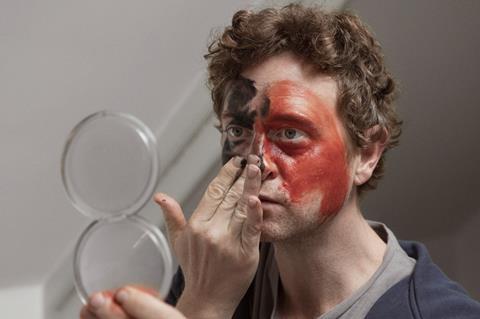A tough story of sexual abuse anchors Isabella Eklöf’s Greenland-set follow-up to ’Holiday’

Dir. Isabella Eklöf. Denmark/Sweden/Norway/Finland/Greenland/Netherlands. 2023. 125 mins
It’s grim up north, and grimmer still within the human soul in the Greenland-set drama Kalak. Swedish writer-director Isabella Eklöf scored a reputation for the rigorously chilly style and fearless eye for humanity’s darkness in her 2018 debut feature Holiday, about the travails of a gangster’s girlfriend. Her follow-up explores differently bleak terrain, and subject matter all the more unsettling in that it is culled from real life – this being an adaptation of Kim Leine’s autobiographical novel about incestuous sexual abuse.
Uneasy viewing on both emotional and political levels
Also comprising a travelogue element, with its Danish protagonist attempting to assimilate to the culture of Greenland, Kalak is nothing if not arresting – especially with its intensely unsettling lead performance from Emil Johnsen as a man enduring the long-gestating effects of trauma. Even at a relatively moderate two hours, however, Kalak often feels like tough going, and with its emotional demands and (at moments) undeniable shock element, it will be a hard sell to audiences not entirely committed to the prospect of Bergman-level psychic turbulence. Nevertheless, Kalak will certainly find a niche constituency, and confirm Eklöf as a serious, audacious psychological observer.
Quite what is at stake in the agonies of Kalak’s hero is made startlingly clear in the opening sequence, as the teenage Jan is sexually molested by his paedophile father Ole (Søren Hellerup). Where films dealing with this theme typically reveal their secret late in the game, Kalak, by presenting it so very frankly – indeed, graphically – at the start, makes the source and extent of Jan’s trauma abundantly clear. After a workshop in which a woman demonstrates the meanings of traditional Greenland face markings – an ethnographic/folkloric dimension markedly absent from what will follow – we see the adult Jan (Johnsen) in 1999 in Nuuk in West Greenland, where he lives with his wife Laerke (Asta Kamma August) and their two young children, and works as a hospital nurse.
Outwardly balanced and happy, Jan remains tormented by his past. He has never told Laerke about his abuse, leaving her to wonder why he is so reluctant to read the frequent letters – one of them depicted in direct-to-camera address – from his father, now suffering from terminal throat cancer. One symptom of Jan’s anguish is a nocturnal restlessness and a need for extra-marital relationships, which Laerke quietly tolerates. But his liaisons are not always so easy for the other women in his life, notably Karina (Berda Larsen) and young mother Ella (Connie Kristofferson), whose sense of abandonment will have tragic consequences.
Jan’s affairs are also underwritten by the uneasy sense that there is an implicit political aspect to Jan’s sexual tourism: ‘NAZI DANE GO HOME’, reads a piece of graffiti, indicating the uneasy relationship between Greenland and the nation that colonised it. Even so, as Jan and family move from Nuuk to a more rugged and remote settlement in the east, he strives to become a kalak – a term translated here as ‘dirty Greenlander’, seemingly both insult and compliment, but apparently implying the possibility of Jan’s total integration into the society he has chosen to escape to.
Two things in particular carry the film, co-scripted by Leine himself. One is the sometimes beautiful but always austere landscape, shot by Nadim Carlsen in way that never remotely romanticises it, but always gives Greenland’s countryside and urban settlements a mundane, concrete tangibility. The other is a terrific set of performances, notably from Larsen and Kristofferson as Jan’s lovers, and from Anders Mossling as the world-weary doctor who sells Jan on the virtues of self-medication – a habit that will prove disastrous when he truly hits the emotional hard shoulder.
In the lead, Johnsen – a Norwegian actor whose recent films include Guro Bruusgaard’s 2021 HIM – is intrepid, plumbing the most painful corners of a brutalised, and in turn brutalising, figure. Johnsen makes Jan’s psychic as well as physical wear and tear apparent, even though his Jan often wears the gentle, almost beatific smile of a Dostoevskian holy fool. The actor contrives to indicate what’s admirable about Jan, a survivor and a loving family man, as well as the ravaging hellfires beneath the calm surface. Even more daring a performance, arguably, comes from Hellerup as Jan’s horrifyingly affable father, who fully comes into focus in a truly distressing reunion scene that illustrates the extent of Ole’s casually amoral, self-serving libertarianism.
Even a two-hour film cannot fully accommodate all the thematic dimensions touched on – and that Leine presumably attempted to bring together in his novel. One suspects that in Scandinavia, there will be debate about whether Kalak – a trans-Nordic production from territories including Greenland – does justice to that nation as a society, or whether Greenland’s material reality is simply exploited here as a vehicle for the angst of a Danish hero (or indeed, the artistic vision of a Swedish director).
At the very least, however, the political contradictions at work manifestly rhyme with Jan’s inner tensions. Certainly, right up to its quietly shocking final act, Kalak makes uneasy viewing on both emotional and political levels – which may ultimately make it register more as a conversation starter than as a fully satisfying cinematic experience. But it’s a film that, once seen, is hard to think of without a shiver – and not just because of the Arctic weather.
Production company: Manna Film
International sales: Totem Films hello@totem-films.com
Producer: Maria Møller Kjeldgaard
Screenplay: Kim Leine, Isabella Eklöf, Sissel Dalsgaard Thomsen
Adapted from the novel by Kim Leine
Cinematography: Nadim Carlsen
Editing: Anna Eborn, Isabella Eklöf
Production design: Josephine Farsø
Main cast: Emil Johnsen, Asta Kamma August, Berda Larsen, Søren Hellrup






![The Brightest SunScreen[Courtesy HKIFF]](https://d1nslcd7m2225b.cloudfront.net/Pictures/274x183/3/5/0/1448350_thebrightestsunscreencourtesyhkiff_312678.jpg)















![The Brightest SunScreen[Courtesy HKIFF]](https://d1nslcd7m2225b.cloudfront.net/Pictures/100x67/3/5/0/1448350_thebrightestsunscreencourtesyhkiff_312678.jpg)

